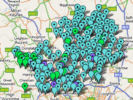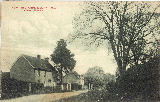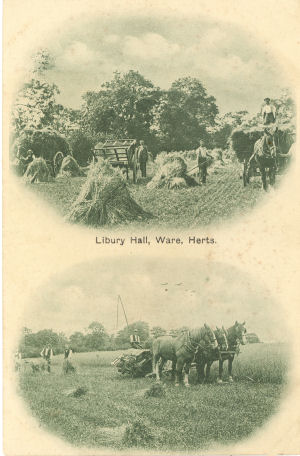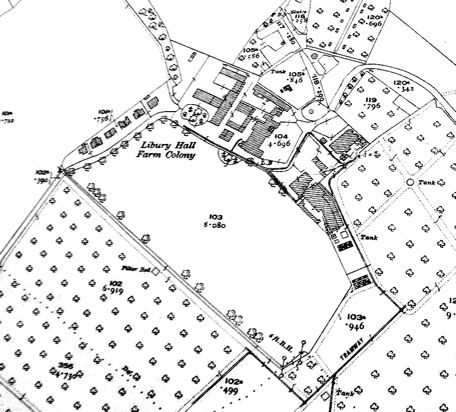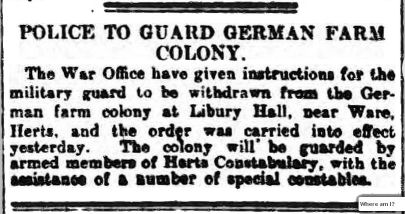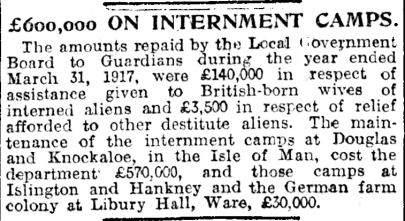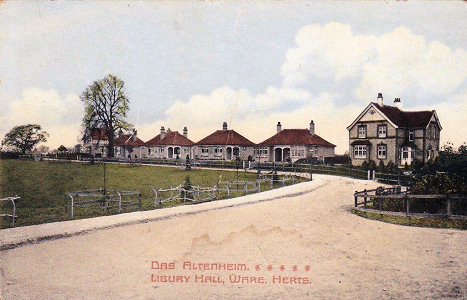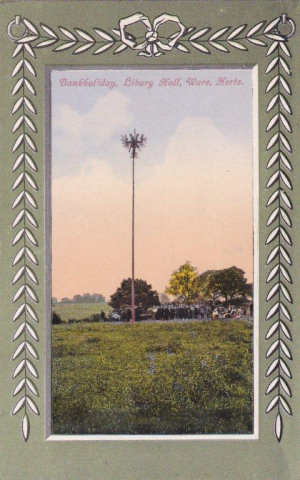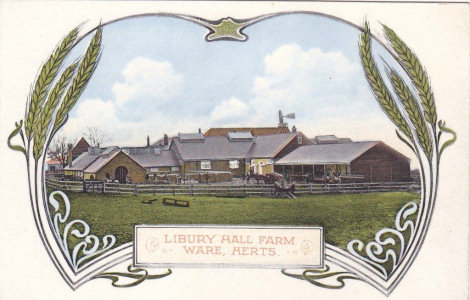|
Libury Hall, Little Munden, early 20th century |
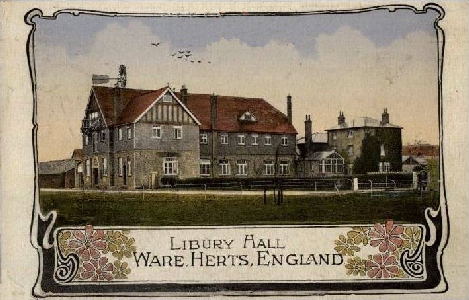 |
Libury Hall Postcard circa 1910 No publisher but frame style is somewhat similar to Franco cards of circa 1910. [But see note on Poultry Farm card below] |
February, 2007
Josephine Richards (jkatierichards @t yahoo.co.uk) writes: I have a death certificate from 1933 that gives the place of death for my grandfather as Libury Hall, Little Munden RD. Standen is the sub-district for registration. Was it a recuperative hospital for the London Hospital?The manor of Libury, Little Munden, has a long history which is available on the online version of the Victoria County History, and a quick google for "Libury Hall" and Munden will show you that it is now a 38 bed care home with a Great Munden address.
In 1933, the year your grandfather died, Kelly's Directory (under Little Munden) says: "Libury Hall has been converted into an institute for aged and indignant foreigners, and the land is leased by the Libury Hall Fruit Farm." So was you father a foreigner? and (tongue in cheek) did he have something to be indignant about.
More interestingly the 1912 edition records: "Libury Hall has been converted into a German Industrial and Farm Colony, to provide work and shelter for German-speaking unemployed and destitute men; the property is vested in three trustees, viz: Baron Bruno Schröder, C.A. Bingal esq. and Baron William Schröder."
In 1917, when the First World War was well underway, the entry had shrunk - but still mentioned the German connection: "Libury Hall has been converted into a German Industrial and Farm Colony, the property is vested in three trustees, viz: Baron Bruno Schröder, C.A. Bingal esq. and Baron William Schröder."
By 1922 the description the German connection had been lost: "Libury Hall has been converted a Farm Colony; the property is vested in three trustees, viz: Baron Bruno Schröder, C.A. Bingal esq. and Baron William Schröder."
By 1926 the entry was identical to the 1933 one quoted above. It may have been some kind of home ever since - but I don't have relevant data to hand.
A further google search provided a long article "The Settlement of Germans in Britain during the Nineteenth Century" which puts the German connection with Libury Hall in perspective. It says that Libury Hall "almost served as a German workhouse for the indoor relief of paupers." See home.clara.net/mawer/ppanayi.html. There are links between the German Hospital that opened in Hackney in 1845 and the London Hospital - with many reference available to you on google.
February, 2008
Vicky Ayadi (vickyayadi @t hotmail.com) of Stevenage writes: I am interested to find out about Libury Hall In Dane End, I know it is now a registered care home, but what before, what are its origins?
As mentioned above, the history of Libury Manor is given on the online version of the Victoria County History but there appears to very little easily available information on the building itself, before the Germans became involved.
An inspection of the building by someone who knows about English Architecture should be able to say something about the age of the current building. It would appear that is of no great historical/architectural interest as it is not listed in The Buildings of England: Hertfordshire or on the Images of England web site, which contains information on listed buildings.
A quick check of the book The Protected Valley: A History of Little Munden, reveals that a John Cock was tenant of Libury Farm in 1841, his landlord being Graciana Spence, who died in 1858 when it when it became the property of Henry Lowry Jearrad. "At the turn of the century Libury was converted into a German Industrial and Farm Colony to provide work and shelter for German-speaking unemployed and destitute people." The wording suggests that the current buildings may have been built circa 1900 - which would explain why there are so few nineteenth century references.
If you want to find more about Libury Farm in the 19th century your best bet is to find out who was living there at the time of the censuses. To get you started I give details of the information in the 1851 census. It was listed as "Libury Farm" - with the husband/head of household away on the night of the census:
|
COCK |
Mary |
Wife |
Mar |
31 |
Farmers Wife |
Codicote |
|
COCK |
William |
Son |
Unm |
16 |
Farmers Son |
Yardley |
|
COCK |
Elizabeth |
Dau |
* |
6 |
Scholar |
Little Munden |
|
COCK |
Emily |
Dau |
* |
5 |
Scholar |
Little Munden |
|
COCK |
Sarah |
Dau |
* |
3 |
* |
Little Munden |
|
COCK |
Eliza |
Dau |
* |
2 |
* |
Little Munden |
|
COCK |
John |
Son |
* |
3mths |
* |
Little Munden |
|
COCK |
Mary |
Visitor |
Unm |
41 |
General Servant |
Yardley |
|
SPRIFFINS |
Frances |
Serv |
Unm |
17 |
General Servant |
Walkern |
|
MUNT |
David |
Serv |
Unm |
15 |
Ag Lab |
Yardley |
|
LIVINGS |
George |
Serv |
Unm |
35 |
Ag Lab Ploughman |
Yardley |
In addition to looking up the entries in the 1841, 1861, 1871, 1881, 1891 and 1901 censuses you could fill in more details about the inhabitants using the techniques described in the tutorial. In addition HALS holds a number of interesting documents from the parish chest - some of which may contain references to Libury.
June 2008
Marj Bennett (marged36 @t btopenworld.com) of Southport, Merseyside, writes: When I sent for my German great-grandfather's death certificate, I discovered that he had died of lung disease at Libury Hall on 12th June 1916. I know that he was taken there from the Isle of Man, where he had been interned presumably as an undesirable alien. His name was John Henry Cors. He had been in England since at least 1877 and had 12 English children.
I decided to have a "google" to look for other similar cases, and found a report headed "St. Stephen's House: Friends' Emergency Work in England 1914-1920." which was published by the Emergency Committee for the Assistance of Germans, Austrians and Hungarians in Distress. It quotes the case of one family that was helped, which also relates to a German who died at Libury Hall:
English woman, bad health, very thin, hysterical and unbalanced, affectionate mother, five children, youngest not weaned at outbreak of war. Husband, elderly German waiter, went to Libury Hall, first winter of war, as they were starving. Remained in internment till the beginning of 1917, when he was removed to the German hospital, dying of cancer. I first saw this family in Lusitania week. They were starving in a frightful Lambeth slum, woman half-distracted and on verge of suicide, refusing to accept any help, defiant and quite desperate. Children frightened and depressed, neighbours hostile; almost no furniture. Altogether a terrible case, even worse after the husband's death. The woman scrubbed theatre floors all day, returning quite exhausted; house-work not done; two babies, one an invalid, left entirely to the care of a highly sensitive little girl of seven, herself half-starved, verminous and failing in health, according to the doctor "from nothing but sheer misery, physical and mental." A very bad air-raid (1917) made matters worse. This child was then adopted and is now well, happy and very intelligent.
The following quote comes from the book "The Internment of Aliens in Twentieth Century Britain":
The Home Office established some unusual internment camps. For example, the premises of the German Industrial and Farm Colony were taken over for such a purpose. This happened at the start of 1915 because of 'an urgent need for an institution for elderly, infirm and rheumatic men whose health is likely to be very seriously injured by detention in Military Camps'. By May 1915, Libury Hall contained 188 internees and continued to operate as a farm colony producing most of its own requirements. The management remained in the hands of W. Müller, the pre-war director, who now acted under the supervision of a British Commandant, and a few police officers. This institution still had 83 inmates in February 1920."
As Libury Hall was officially used as an internment camp I checked the National Archives index and there are extensive records covering this use of Libury Hall which could well be worth checking, as some may include the names of the people interned there.
December 2008 - Note on earlier history of Libury
Colin Hague (crhague @t btinternet.com) of Windsor, Berkshire, provides some earlier information: My g-g-g-grandfather George LAWRENCE (approx 1787-1839) farmed Libury / Lybury / Lyebury Farm with his wife Charlotte (née GODDARD). They wed at Great Munden 16/07/1807. His father John (approx 1759-1797) is listed as a Yeoman, as his his father John (b app 1733) before him, and hence they may well have farmed the same land.
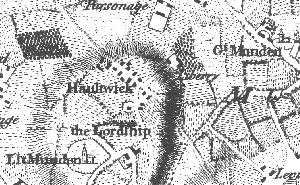 I
would assume that the Lawrence family
were tenants of the Spence family,
Cussans records that
Robert Spence, Citizen and Fishmonger of
the City of London purchased the Manor
of Libury /
Libery in 1608 and was held by a Spence until Miss
Gratiana Spence died in 1858. It then
passed to Henry-Lowry Jearrad, who was
heir-at-law.
I
would assume that the Lawrence family
were tenants of the Spence family,
Cussans records that
Robert Spence, Citizen and Fishmonger of
the City of London purchased the Manor
of Libury /
Libery in 1608 and was held by a Spence until Miss
Gratiana Spence died in 1858. It then
passed to Henry-Lowry Jearrad, who was
heir-at-law.
The map is a small detail from Dury & Andrew's 1766 map showing Liberry, between Little & Great Munden. Libury was nearer Great Munden church - and since a parish boundary change in 1883 it is now in Great Munden, although members of the Lawrence family may well have used the nearer Great Munden Church as I notice that Cussans records that there were Lawrence family gravestone at Great Munden. (I wonder if they are still there?)
May 2011
| Poultry Farm, Libury Hall,
Ware, Herts The card was printed in Saxony, and the back is compatible with a pre-WW1 date. There is no publisher information but the card is numbered "R 11382" and the stamp box is numbered "30837" The card of Libury Hall (above) has a similar back numbered "R 11388" and "30838" |
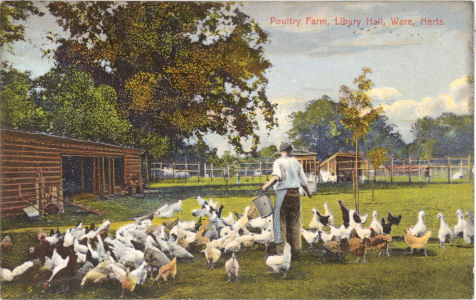 |
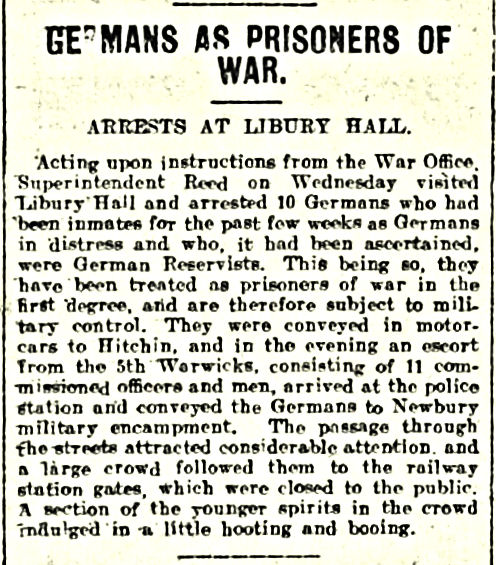 |
The timing of this news report is interesting. It is not clear whether the arrested men were residents in the home for Germans in distress before the war was declared, or Germans soldiers who happened to be in England and who had rushed to take refuge in the home after the war was declared. I suspect the former applied in most cases. They were Germans who had come to England to live and work here in preference to Germany (perhaps with a wife and family) and who had fallen on hard times. If this is the case they may well have been in England because they were reservists and didn't want to be in the German military reserve!
North Herts Express September 1914 Cutting from tweet by @Herts_at_War |
The outbreak of war saw people become hostile to foreigners and Germans living in Britain were seen as a threat Many were sent to internment camps for the duration of the war. They were moved across the country and colonies were set up in Hertfordshire to meet the demand, which did not always meet with local approval. Libury Hall, in Great Munden, near Ware, was the country's largest internment camp. Before the war the manor house had been converted by Baron Bruno Schröder, C A Bingal Esq., and Baron William Schröder to provide work and housing for unemployed Germen men. The home was largely self-sufficient and grew its own produce on its 300 acre estate.
Over the course of the war 556 German men from 60 to 90 years old were interned at the hall. The British Home Office were happy for the camp to run as it had before the war and the director W. Muller remained under the supervision of a British Commandant and an armed police guard.
Not everyone was happy to have the German internment camp on their doorstep. After the 1915 Zeppelin raids on Hertford Sir John Rolleston, the town's Conservative M.P., write to the War Office complaining 'the people of the district hate this nest of enemies in their midst.' Rolleston feared the camp was a hotbed for spies and the locals protested against the camp, and there was even 'a disturbance in the nature of a small attack.'
Speakers from The Anti-German League in Hertford called for the camp to be 'smoked out' at a meeting in Bull Plain in October 1915. They told locals that the camp had built a gun emplacement and were sending signals to German spies.
A Government spot check found that the gun emplacement was in fact building works and that the telegraph wires were not accessible to the camp.
The number of police guards were increased and able-bodied inmates were moved to other camps. Libury Hall continued in this manner until the end of the war with 83 Germans still living there in 1920. Tosay the hall is a retirement home (for ant nationality).
Herts at War Exhibition
Libury Hall Farm Colony in 1923 OS
-
-
1902 The Kent & Sussex Courier of 5th November 1902 published an article "For Poor Germans in London" which describes the Handwerker Heim in London and refers to the Arbeiter-Kolonie at Libury Hall. 1906 The Lincolnshire Chronicle of 13th July 1906 published an the details of the first five years at Libury Hall showing that 2,500 men were admitted, 900 of which earned enough to return to Germany and a similar number found work elsewhere.
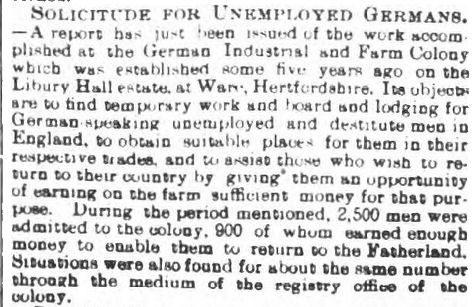
1909 The Times of February 2nd 1909 published an article quoting the admissions to Libury Hall in relation to the admission of aliens under the Aliens Act. The admission of undesirable aliens was obviously an issue as the article was reprinted in the Leamington Spa Chronicle three days later saying "It is scarcely necessary to point out that if the meshes of the official net are sufficiently wide to admit of the entry of 666 unquestioned German aliens then they must be as accommodating with regard to hundreds, nay, thousands, of Russians, Italians, Austrian, and other Continental aliens."
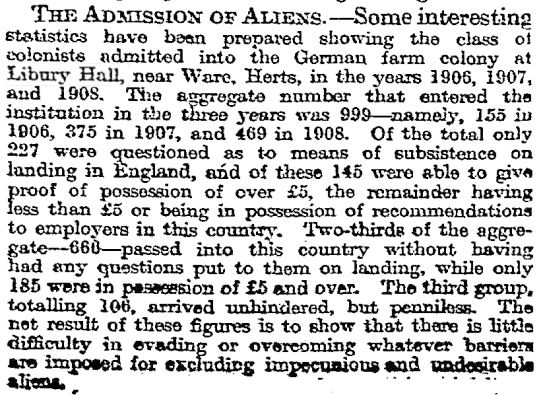
1910 The Luton Times and Advertiser of 16th September 1910 reported that "Messrs Wernher, Beit and Co. subscribed £500 to the funds of the German industrial and farm colony at Libury Hall, Standon, Herts., which deals with an average of 100 colonists daily."
1913 Herts Mercury of 6th September, 1913 reported at length on the suicide of Hug Friedrick August Maass at the Deutsche Arbeiter Kolonie. The report mentions Friedrick Jahnke (porter), August Clemens (head steward), William Muller (managing director) and Peter Peters (master tailor) who fell dead on hearing the news of Maass's death. It records that there was a German Burial Ground in Little Munden churchyard reserved as a final resting place for members of the colony by a faculty granted by the Bishop of the diocese.
Herts Mercury of 18th October 1913 reported that a small orchestra from the Hall played at a local function. This gives an impression as to how the Colony was viewed prior to the Great
War.1914 On October 30 The Biggleswade Chronicle reported: "An order has been issued by the Home Office to the police, instructing them to arrest all Germans, Austrians or Hungarians in their district of military age, and hand them over to the military authorities ... At Libury Hall (the German Farm Colony) a great number of arrests were made ..."
1915 A number of papers all over the country posted virtually identical items. This comes from The Edinburgh Evening News of 24th April, 1915
On 20th July, 1915 the Luton Times and Advertiser wrote:
The German Farm Colony at Libury Hall, Little Munden, is, it is stated, to be used for the accommodation of 250 alien enemies who through age and infirmity are physically incapable of any mischief and who owing to long residence in the United Kingdom have lost connection with their native country and would not be a danger to this country. The expense of maintenance will be borne by the governors of the institution, who have a substantial income from invested funds for the benefit of Germans.
On 1st October, 1915, the Bellshill Speaker & North-East Lanark Gazette wrote:
OUR GERMAN AGRICULTURISTS. Thanks to the fearless and patriotic action of the Globe, we have been made aware of yet another plague-spot — the German farm colony founded some years ago for the relief and instruction of Germans, and now declared, upon excellent authority, to be danger to the community. Our gentle kinsman, from across North Sea or German Ocean, bringing his kultur with him, is once again faithful to his tradition — of biting the hand that fed and nourished him in his adversity. This farm colony is Libury Hall, near by the village of Mundcn, and some six and three-quarter miles north of Hertford — also in convenient proximity to peculiarly vulnerable stretch of the Great Northern main line, for the Welwyn viaduct is close by.
This agricultural training school and refuge for the impoverished alien has acquired such sinister reputation for devoting itself to other than agricultural pursuits that, usual after long delay, guard was set upon it, and it was called place of internment. But those who should know declare the guard to be utterly inadequate, and that, to all intents and purposes, the students the gentle art of tillage are practically as free as heretefore to play the spy and traitor, and are making the most of their opportunity. A local resident vouches for it that, for instance, Herr Muller, head the colony, visits London once or twice a week, unattended, and that he made one of his journeys on the day following the last Zeppelin raid upon London. Also, the same deponent tells us, Herr Kanothé, manager of the settlement, is still a regular attendant at local markets, where he is free buy and sell, and no doubt to transact such other business may be helpful to the Fatherland, as any Englishman.
Anyhow, here is a case, since the authorities still persist in playing their well tried part of dormice — for the general public to make its feelings known in effective manner. The Anti-German Union is now engaged in focussing the popular and growing indignation; and, as in the case of the German church and a score other cases, it is hoped that very soon, on Saturdays and Sundays, demonstrations will held the settlement itself, and at neighbouring towns and villages, so that this singularly mean and contemptible example of enemy evil-doing may be put stop to.
On 12th November, 1915, the Biggleswade Chronicle wrote:
GERMANS IN HERTS - At the Herts. County Council meeting St. Albans on Monday, the case the German Farm Colony at Libury Hall in the Hitchin Police Division, was again referred to. It was said that large number of Germans, many of military age, were interned there, it being considered by the responsible Government that through physical and other reasons they were not a source of danger to the country.
The Right Hon. T. F. Halsey, chaiman of the County Council, very strongly criticised the action of the Government department. Although a commandant had been appointed to the colony there was not a sufficiently strong military guard and the people in the district were afraid that the Germans would escape. The appointment of a commandant suggested that the colony was recognised as a concentrated camp; although the guard was still composed of the County Police and special constables.
1916 The Military Tribunual found the high wages paid to women working at the German internment camp at Libury Hall mad it difficult for them to enlist farm labourers because there were mo women available in the area to take on the farm work. - from news item Herts Mercury 4th November 1917 The Herts Mercury of 12th May reports the death of the Captain George Alexander Merry, commandant at Libury Hall. 1917 This news about the cost of the camp was published nationwide, this cutting is from the Manchester Evening News of 17th August.
September 2015
S J Howitt writes: There is an unmarked plot with a simple stone marked "For the foreign persons who died at Libury Hall and are buried in this place" at St Edmund and The English Martyrs RC Church Old Hall Green.There are some named records but not all and re the 1st World War internments according to the NRA at Kew these would have been lost during the bombing of Red Cross Geneva 1940.
February 2016
Nicholas Rowe writes: Like several of your earlier correspondents I am researching a man who died at Libury Hall, and his family. His name was Julius Bernhard Philipp. He died at Libury Hall on 27th April 1942, aged 75. Like the previous family history researcher on your site I have found that his death certificate merely specifies the informant, a G Rowley, ‘Causing the body to be buried’.Julius Philipp (aka Joseph Barnard Philipp after the Great War) was born in Germany in 1868 and was a manufacturers agent at the time of his death, and had been a commercial clerk at the time his daughter, Cora Stephanie, was born at Beulah Hill, Norwood, in 1900. He and his partner, Helena Rose Copland, lived at various addresses in South London, including Fieldhouse Road, Balham. They were not married, probably because one or both of them was already married; Julius Philipp describes himself as married in the 1939 Register of Civilians.
There is a reference in a Dundee newspaper of 1938 (available from the British Library’s newspaper archive online). This featured an article entitled, The Foreign Bits of Britain. While the writer’s objective was clearly political in that the original subject was the planned settlement of German refugees from the Sudetenland in an unnamed village in Scotland, there is a lengthy paragraph about Libury Hall German Farm Colony. At that time it was used exclusively as an old peoples’ home for German residents.
The man I am researching had a partner at the time he died, a much younger woman named May Oven, whose birth was registered in Ware, and who was granted probate of his estate, some £40. However, as they were not married it does not appear that she had any authority over burial arrangements. The 1939 Register of Civilians shows them as living in Islington, London. The question arises as to how they met. Julius Philipp may have had a connection with the Hall during the Great War, and possibly again in the early 1930s when he disappears from the London electoral registers, having lived there since the late 1920s.I have an unused postcard that presumably dates from before the Great War and which was printed in Saxony. This card shows a row of building called Das Altenheim (the old peoples’ home), Libury Hall, Ware, Herts. These consist of a single-fronted detached house and four bungalows on one side of a lane. At the end of the row of bungalows is a building that looks like a small chapel. On the opposite side of the lane there is a row of small trees, each enclosed in fencing. On the Ordnance Survey map of 1923 that you feature on your website these buildings can be easily identified on the western part of the site where the lane turns a corner leading away from the main group of buildings.
So it can be seen from Julius Philipp's death that Libury Hall continued to be used as a residence for people of German origin as late as 1942.
Since 2014 the British Newspaper Archive has extended its cover and I have added a few news items to the list given above.
December 2008
Page updated November 2009 Link to Yew Tree Farm added May 2011 Poultry farm P.C. June 2014 News Cutting Sept 2014 September 2014 OS map setail September 2015 Note from S J Howitt February 2016 Information from Nicholas Rowe July 2016 Post card images supplied by Nicholas Rowe
